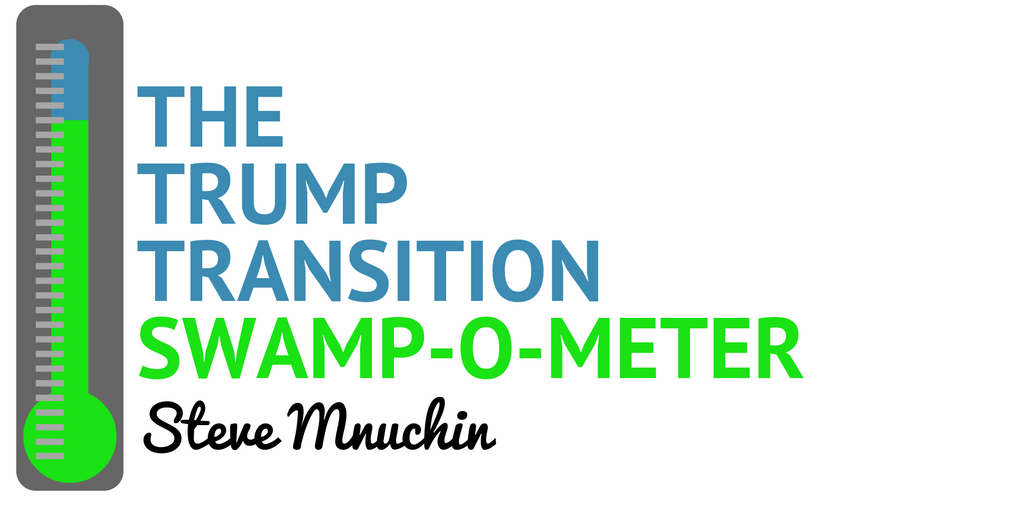
Steve Mnuchin, nominee for secretary of the treasury, is a 4 out of 5 on the Swamp-O-Meter. While homeowners, communities, and the American economy suffered deeply during the financial crisis, the Wall Street financier turned hedge fund manager made billions in profits on the backs of taxpayers by churning out discriminatory foreclosures. He will now be positioned to personally benefit from the very deregulatory and tax giveaway plans he will put forward. When you look up “swamp” in the dictionary, you see “Mnuchin.”
Who is Steve Mnuchin?
Steve Mnuchin was one of President-elect Donald Trump’s all-white, all-male, all-Steve team of economic advisers announced in August. Mnuchin is a banker and hedge fund manager with no policy or political experience. He did, however, help the Trump campaign raise tons of money. The son of a New York banker, Mnuchin comes to his nomination as secretary of the treasury directly from the swamp of Wall Street. He spent 17 years at Goldman Sachs building a fortune before starting his own firm. In his decades on Wall Street, he oversaw fraudulent foreclosures and profited off major bankruptcies and Ponzi schemes. He also founded and manages the hedge fund Dune Capital. In other words, he is far from a populist and doesn’t instill a lot of confidence in Trump’s promise to “drain the swamp” and to go hard on Wall Street.
4 ways Steve Mnuchin will go against Trump’s populist promises and protect big banks
- Steve Mnuchin’s company has a history of discrimination against people of color.
OneWest Bank, a mortgage firm that Mnuchin built and ran until last year, has a history of discriminating against black and Latino homebuyers. Just a few weeks ago, two nonprofits filed a complaint against OneWest, claiming that the bank intentionally kept branches out of communities of color. According to the complaint, OneWest’s rate of lending in these areas significantly lags behind that of other lenders in California, and 68 percent of the nearly 37,000 foreclosures undertaken by the bank between 2009 and mid-2016 were in areas where nonwhite residents represented the majority.
- Steve Mnuchin’s bank was a “foreclosure machine.”
OneWest Bank got its start when Mnuchin’s firm bought the bankrupt mortgage lender IndyMac. OneWest began in the midst of the 2008 financial crisis when Mnuchin was able to profit by buying pieces of failed banks, all while OneWest capitalized on struggling homeowners. The firm’s practices were so bad it was called a “foreclosure machine.” According to The New Republic, “Even among the many bad actors in the national foreclosure crisis, OneWest stood out. It routinely jumped to foreclosure rather than pursue options to keep borrowers in their homes; used fabricated and ‘robo-signed’ documents to secure the evictions; and had a particular talent for dispossessing the homes of senior citizens and people of color.” OneWest also submitted to a consent decree because regulators determined that the firm had engaged in “unsafe” and “unsound” handling of mortgages and foreclosures.
- Even outside his mortgage lending, Steve Mnuchin’s got shady business practices.
Through Dune Capital and other funds, Mnuchin has provided backing to films such as “Avatar” and “Suicide Squad.” But during his time in Hollywood, Mnuchin completed at least one deal that aroused legal suspicion. Mnuchin announced in October 2014 that he would become a major backer of a now-bankrupt media production company called Relativity Media. Mnuchin quietly left Relativity’s board of directors just before the company declared bankruptcy in 2015. This is where it gets good: Mnuchin’s departure from Relativity’s board occurred just after Relativity made a payment of $50 million to Mnuchin’s mortgage lending company, OneWest.
- He could kill Dodd-Frank and risk the economy but make big banks really happy.
Trump has been insistent that he would kill Dodd-Frank, the 2010 law that strengthened regulation of the finance industry. This would amount to the most rapid financial deregulation in history and could lead to grave consequences for the economy. Plus, his campaign rhetoric has hidden a policy agenda that is “incredibly favorable to bankers.” So putting someone who made a fortune by kicking people out of their homes in charge of keeping the financial industry accountable looks a lot like asking the fox to guard the hen house.
How you can #ResistMnuchin
The secretary of the treasury must be confirmed by a majority of the U.S. Senate Committee on Finance and a majority vote on the floor of the Senate.

Call, write, or tweet:
- Orrin Hatch (R-UT) at 202.224.5251
- Chuck Grassley (R-IA) at 202.224.3744
- Mike Crapo (R-ID) at 202.224.6142
- Pat Roberts (R-KS) at 202.224.4774
- Michael B. Enzi (R-WY) at 202.224.3424
- John Cornyn (R-TX) at 202.224.2934
- John Thune (R-SD) at 202.224.2321
- Richard Burr (R-NC) at 202.224.3154
- Johnny Isakson (R-GA) at 202.224.3643
- Rob Portman (R-OH) at 202.224.3353
- Pat Toomey (R-PA) at 202.224.4254
- Dean Heller (R-NV) at 202.224.6244
- Tim Scott (R-SC) at 202.224.6121
- Bill Cassidy (R-LA) at 202.224.5824
and demand that they stand up against the grave threat that Mnuchin poses to the economic security of working families.